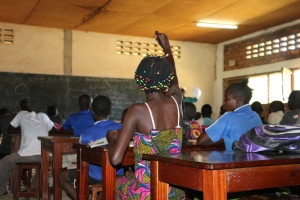Nadine and Jonathan: hopes for a bright future
2016-02-16
© UNICEF/UN08030/Le Du - After a morning of catch-up classes, children freshly released from armed groups enjoy a sports class. 2,662 children have been released in 2015 throughout the Central African Republic.
Didier Martial Pabandji, Communications Specialist at UNICEF Central African Republic
When the headmaster calls her name, Nadine* jumps from her seat and runs up to the stage. She greets the teachers, grabs her certificate and turns to face dozens of cheering children. She is trying to hide her smile behind her hand, out of shyness, but everyone in the room can sense her happiness and pride.
Just four months after being released from the anti-balaka armed group in Bangui, along with 90 other children, Nadine, 17, has made it to the second rank in her class. A great turnaround for a life that had taken a turn for the worst three years ago, when the mostly Muslim seleka rebels started to march towards the capital where they finally overthrew the government. “I lived with my family in a town called Dekoa,” she says. “When the seleka rebels came into town, my mother was killed by a stray bullet, and my father was murdered just outside our house.”
With no family to support her, Nadine decided to join the rival militia, the anti-balaka (which in local language means anti-AK47 bullets). “They said if I came with them, I could become a woman and take care of my little other,” she recalls.
Nadine then started to walk with the group. A very long walk, 300 km to the capital Bangui. “I would carry the bags, the food, sometimes the weapons, and I would also cook for the group.” By that time, she had become pregnant by one of the militiamen. “I was 15, and still a virgin, but he said I was old enough to become his woman”

© UNICEF/UN08030/Le Du In the same classroom that Jonathan and Nadine attend, a fellow student raises her hand.
Sitting next to Nadine is Jonathan*, also 17. Also a former member of the anti balaka group, he spent over a year with them, in a makeshift camp just outside town. “Life was so difficult out there,” he says. “Finding food was a struggle, there was no healthcare, and several times I was sent out to controls barricades or take part in attacks against Muslims”.
The scars on Jonathan’s face tell the story of the violence, torture and mistreatments he had to endure from the older ones in the group. The invisible scars will take longer to heal, but he is working hard on rebuilding his life.
“Last May, I heard that UNICEF was willing to take kids like me out of the groups and help them,” he says. “I asked my commanders to put me on the list, and a few weeks later I was here, taking catch-up classes. Now I can read and write, and I want to become a driver,” he says, proudly showing his certificate.
In 2015, UNICEF and partners have released 2,662 children from the armed groups, throughout the Central African Republic. Thousands more are still with the groups, exposed to violence and abuse. UNICEF continues to work with partners to provide essential services for these children.
*Names have been changed









